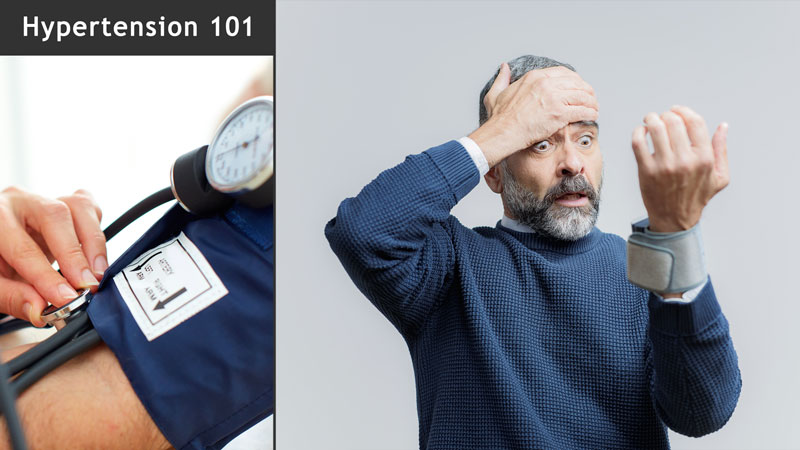By Marc Braman, MD, MPH
Marc Braman (MD, MPH):
This is Introduction, or Orientation to Hypertension, or High Blood Pressure 101.
We have this amazing, wonderful vascular system. We think about the heart, but it’s actually all of the blood vessels throughout the entire body. The heart does the pumping, but we have a lot of plumbing. It’s carrying the current of life, and this has been the topic of many cultural things over the centuries and the millennia, in terms of the heart, descriptively, figuratively, and physically.
Now, this amazing system adjusts moment-to-moment, minute-to-minute, based on our needs, how excited we are, what’s going on. It keeps everything flowing: the nutrients, the oxygen, picking up the waste and taking it back. Especially for the brain.
Now, why is hypertension, or high blood pressure, important? Most of us know what high blood pressure is. We know it’s too much pressure. But why is it important? It’s kind of like the oil pressure in your car. That oil needs to be circulating all the time, keeping things healthy, working right. When that light comes on on your dash, you really need to pay attention. It could indicate a very critical problem.
Now, there’s two big concepts around why it’s important. One of the prime reasons this is important is that high blood pressure is an indication that systems and bigger things aren’t working well. We need to pay attention. It is also one of the direct mechanisms for damage to the blood vessel system leading to heart attacks and strokes. It’s both an indicator, or symptom, and it’s a cause.
Now, the organ at issue, many people think, is the heart. It’s actually not. The heart, in and of itself, needs the plumbing to supply the oxygen and the nutrients, just like the rest of the body. It’s actually the endothelium, or the tissues lining the blood vessel walls, that’s the organ at issue.
Now, there’s several key systems that we really need to understand. One is the quality of the blood. Now, the science is showing that there is a direct relationship between quality and blood pressure. What do we mean by quality? Well, most of us know about cholesterol. Cholesterol being high is a problem. Until recently, however, we didn’t realize that cholesterol formed crystals, like little razor blades cutting through the endothelial layers lining our blood vessels, creating real problems.
Now, there’s also the thickness of the blood, which means the heart has to pump more, which means there has to be more pressure. This has to do with inflammation, and a number of things, and especially a compound called fibrinogen, which has to do with our clotting system, that makes the blood thicker. I’m not sure why I was never taught this in medical school, and other docs aren’t taught this, but the science is pretty solid. There’s a direct relationship between viscosity, or thickness, and blood pressure.
Now, kidneys are really, really key. The kidneys are what manage the fluid balance in this system. Many blood pressure medications work as diuretics, meaning they make you pee. They get rid of extra fluid, keeping the pressure down. The other big system involved in blood pressure is the nervous system. Now, this has two main connections. One is it’s just directly wired. You have wires going directly to your blood vessels. And the other is to your adrenal glands. These sit on top of your kidneys and put out adrenaline, and stress hormones.
Now, one important thing we need to look at as we’re getting started is, isn’t high blood pressure just a part of normal aging? I was taught this in medical school, but it turns out, it’s wrong. It’s just plain wrong. I later took classes in a master’s degree for epidemiology, thinking I was going to go into research. Epidemiology of cardiovascular disease taught me, looking around the world, that many people around the world, especially third world countries, actually never get high blood pressure.
Now, this is important, because we need to realize what normal is, and actually for human beings, it is not normal to get high blood pressure. Now, yes, we have genetic tendencies, and so forth, but what we see in the science is that all different ethnicities, all different genetics, when they come to a country like the U.S. and live like the U.S., they get the U.S. diseases. The lifestyle diseases.
Now, it’s true aging has an effect on everything. Things fall apart. We’re all going to die. But with the science showing that it is all around the world where we see this change, and this association with lifestyle, it has to be how we’re living that’s the big cause. It’s not primarily aging. It’s not primarily genetics. Lifestyle trumps those things.
Now, just to give you a taste, how powerful is lifestyle medicine for high blood pressure? Here was a study: 174 patients in a row, with blood pressure over 140/90. They did two to three days of just fruits and vegetables, about another 10 days of water-only fasting, and then a week on a super healthy vegan diet. Now, what percentage of these 174 people do you think got completely off of medications? 100%. What percent got their blood pressure below 140/90? 90%.
Now, this is just in 20 days. I can tell you that I have seen first-hand, without the long water-only fasting, but a lifestyle program that’s intensive, at a center, easily over 50% of people get off their blood pressure medications to normal in 21-days or less. No fasting. Logically, lifestyle should be the number one approach. Fortunately, the new guidelines reaffirm and strengthen that lifestyle medicine is the number one therapy. It should be foundational to hypertension treatment and many other conditions. Now, we’re going to walk you through those guidelines in one of our other sessions.
Now, as we dive into high blood pressure, how our blood pressure works is actually very simple. Here’s a reference point. The human body is designed to work best in that paradise-like scenario that we all have in the back of our heads, and all societies around the world have. Stress-free, fresh fruits and veggies, sunshine, so forth and so on. The farther we get away from that, the more the warning lights come on, the more the systems fail, including our vascular system.
Keep in mind, medication should be an adjunct, as we say in medicine, or an accessory to the main or primary treatment of treating the cause, lifestyle medicine. Now, let’s empower you to use lifestyle as medicine.
Direct relationship between blood pressure and blood viscosity in normal and hypertensive subjects. Role of fibrinogen and concentration. Letcher RL, Chien S, Pickering TG, Sealey JE, Laragh JH. Am J Med. 1981 Jun;70(6):1195-1202.
Plasma viscosity in isolated systolic hypertension: the role of pulse pressure. Ciuffetti G, Schillaci G, Lombardini R, Pirro M, Vaudo G, Mannarino E. Am J Hypertens. 2005 Jul;18(7):1005-8.
Male gender, increased blood viscosity, body mass index and triglyceride levels are independently associated with systemic relative hypertension in sickle cell anemia. Lamarre Y, Lalanne-Mistrih ML, Romana M, Lemonne N, Mougenel D, Waltz X, Tressières B, Etienne-Julan M, Tarer V, Hardy-Dessources MD, Connes P. PLoS One. 2013 Jun 13;8(6):e66004. doi: 10.1371/journal.pone.0066004. Print 2013.
Mineral water intake reduces blood pressure among subjects with low urinary magnesium and calcium levels. Rylander R, Arnaud MJ. BMC Public Health. 2004 Nov 30;4:56.
Medically supervised water-only fasting in the treatment of hypertension. Goldhamer A, Lisle D, Parpia B, Anderson SV, Campbell TC. J Manipulative Physiol Ther.2001 Jun;24(5):335-9.
2017 ACC/AHA/AAPA/ABC/ACPM/AGS/APhA/ASH/ASPC/NMA/PCNA guideline for the prevention, detection, evaluation, and management of high blood pressure in adults: a report of the American College of Cardiology/American Heart Association Task Force on Clinical Practice Guidelines. Whelton PK, Carey RM, Aronow WS, Casey DE Jr, Collins KJ, Dennison Himmelfarb C, et al. Hypertension, 2017.





